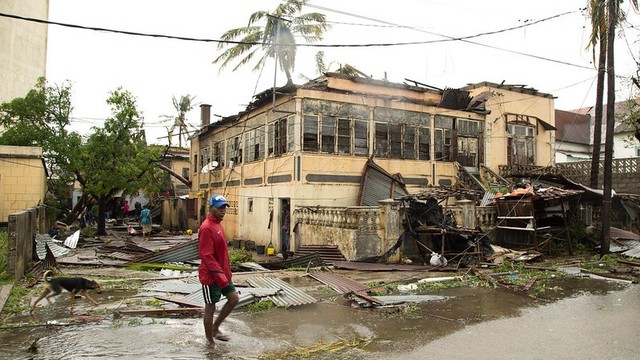10 years on: What Haiti taught us about urban crises and community planning
In the wake of the devastating 2010 Haiti earthquake, significant resources were channelled to neighbourhood-level projects, precipitating numerous innovations in community planning. On 23 January, an IIED event drew out the lessons learned from the emergency relief and recovery phases that continue to be relevant for the planning community and humanitarian actors operating in complex urban environments.

Planners and other stakeholders in Haiti use large-format satellite photographs used with transparent overlay for annotation and in fieldwork (Sylvain Joachim/Emergency Architects)
In January 2010 the Haiti earthquake devastated the capital city of Port au Prince, with significant loss of life and tremendous damage to housing and infrastructure. The impacts of the earthquake directly affected some three million people in Port au Prince and the surrounding area.
The crisis triggered a global outpouring of aid. As part of the recovery effort, more than 50 organisations and the government of Haiti engaged in an extraordinary collective effort of humanitarian community planning that engaged over 30 neighbourhoods.
These initiatives led to a great deal of variation in community planning, but also considerable soul-searching among humanitarian actors who struggled to engage with issues of chronic urban poverty and informality and the complexity of urban systems.
Ten years on from the earthquake, this IIED event launched a new working paper, 'Learning from community planning', by Darren Gill, Laura Smits and Maggie Stephenson, and a related digital archive that reflect on and document the wealth of experience generated by community planning initiatives across the city of Port au Prince after the earthquake.
A panel of experts, including two of the authors of the paper, discussed their experiences working in Haiti before and after the disaster.
The speakers explored what the longer-term impact of community planning has been on informal settlements in Port au Prince, and the extent to which lessons from Haiti have informed humanitarian actors, including a new generation of urban planners, and shaped urban crisis response over the subsequent ten years.
About the panellists
- Lucy Earle (moderator), principal researcher, Human Settlements research group, IIED. Previously an urban adviser for the Department for International Development in the UK government, she is now leading IIED's work on humanitarian crises in urban areas and understanding and responding to movements of refugees and internally displaced people in to urban areas.
- Maggie Stephenson, architect and author of the working paper 'Learning from community planning'. She has worked on housing and urban issues for 25 years with municipal and national governments, NGOs and the United Nations. She has been involved in development, crisis response and recovery in both natural disaster and conflict situations, including through policy and institutional support and in direct project implementation. She has also worked in built environment education in a number of roles. Following the earthquake, she worked in Haiti for three years as UN Habitat recovery advisor, supporting the government of Haiti and partner organisations on safer construction and the development of housing and urban policies.
- Laura Smits, urban planner at the City of Amsterdam and author of the working paper 'Learning from community planning'. She was trained as an architect and urban planner at Delft University of Technology, and started working in the development sector after the earthquake in Haiti in 2012. In Haiti, she worked for UN Habitat and Cordaid on shelter and settlements programmes. Laura recently co-authored a chapter on the emergence of the informal neighbourhood of Canaan in Port au Prince Haiti in the Routledge Handbook on Informal Urbanisation (2019).
- Ann Young Lee, CEO of CORE (Community Organized Relief Effort), who has almost 20 years of experience managing large-scale humanitarian response and sustainable development programming across a variety of sectors: including emergency relief, community upgrading and infrastructure, livelihoods and economic growth, and local governance. At CORE since 2016, she has overseen the successful transition from a Haiti-based recovery organisation to an international response and resilience-building NGO, responding to crises in across the Caribbean and the continental United States.
She previously worked at the UN’s Organization for Coordination and Humanitarian Affairs (OCHA), serving as the lead on urban humanitarian response for the Secretary General’s World Humanitarian Summit, and acted as Haiti country director for CHF, where she was responsible for a $150m portfolio of projects including emergency shelter, neighbourhood planning post disaster, construction, debris removal, and livelihoods.




